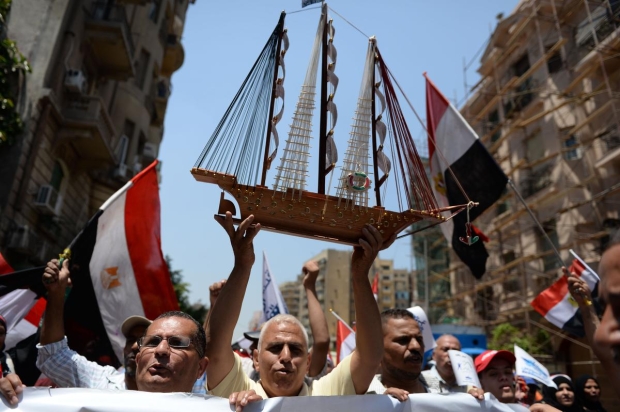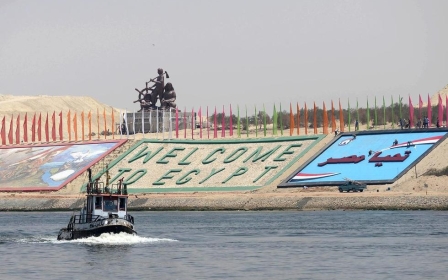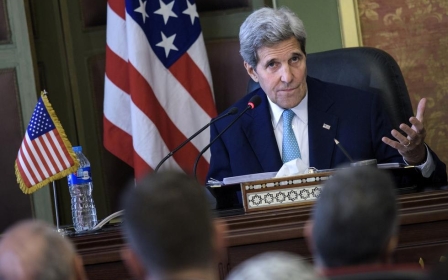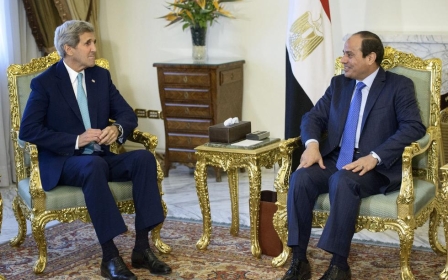Suez Canal opening celebrations bring Cairo to a halt
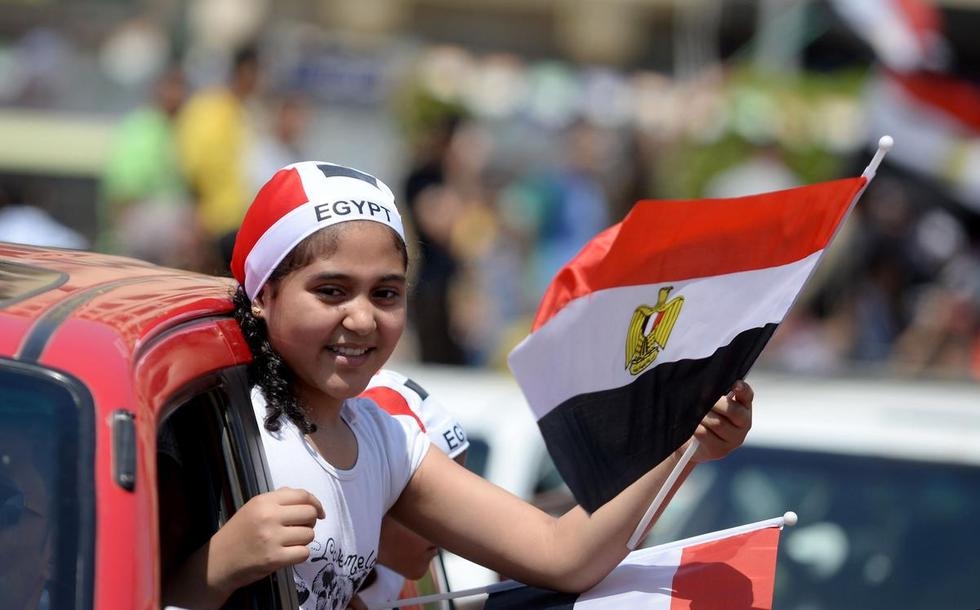
CAIRO - The extension of the Suez Canal, inaugurated with national celebrations on Thursday, has been dubbed “Egypt’s gift to the world” by President Abdel Fattah al-Sisi.
Thousands gathered to mark the “historic day” which was described by authorities and ads across Egypt as a miracle of engineering and the product of the Pharaohs’ genius.
Sisi, donning his full military uniform, began the ceremony by arriving on a historic yacht as jets and helicopters flew overhead. While thousands of foreign reporters were supposed to have been granted access, hours before the ceremony almost no one had received clearance. Instead, an email went out at around 3am local time telling journalists to meet at specific sites at 7am if they wanted to gain access.
Despite this, the fanfare has resonated throughout the country. It has been difficult to turn on the TV or radio in recent weeks and not be confronted by news of the government’s feat. Scenes were broadcast widely in Egypt, with a national holiday being declared to mark the occasion.
Reports celebrating the fact that the project was completed in a year - instead of the two years originally estimated – thanks to a presidential dictate have all but played on repeat. Days before the opening cartoons appeared in Egyptian newspapers depicted long-time president Nasser welcoming Sisi in the pantheon of the country’s leaders.
Ordinary Egyptians have flocked to lend their support, purchasing $9bn worth of Suez Canal bonds. Lured in by the expected high returns on investment, not to mention the waves of nationalist propaganda that have surrounded the project, the scheme sold out in less than two weeks. If successful, authorities predict it will increase annual revenue from $5.5bn in 2014 to $13.5bn in 2023.
"It's an achievement for the people who managed to fund it as a national project and accomplished it through perseverance and hard work," Sisi's office said.
For days Egyptians have waited in anticipation of the opening that, according to the head of the Suez Canal Authority Mohab Mamish represented “the passing of the nation from darkness to light”.
The pro-government press has followed with reports that the construction of the “new” Suez Canal marks the final chapter in the transition from Muslim Brotherhood rule. Some have gone as far as to say that the Muslim Brotherhood had been conspiring against the nation, hoping that the project would fail.
On Wednesday evening, street carnivals weaved themselves through Cairo, while makeshift sound systems on street corners blasted old tunes and nationalistic songs, with a few new patriotic pop songs added just for the occasion.
A stream of lights led drivers on the Nile corniche and a fully adorned Tahrir Square, famed as the epicentre for protests that would eventually help drive both of Sisi’s predecessors out of office.
White and blue lights were hung on three sides of the square, but on one a glaring array of blue, green and red lights broke the pattern – it was not immediately clear why. The tall flagpole standing at the square’s centre was also kitted out in a beam of often contrasting lights that shone on it and other statues and buildings across the city.
“In the background, on the Nile shore, the tall tower hosting the Ministry of Foreign affairs stood out for originality. The windows on of the facade, in fact, were lit up so as to form the numbers six and eight,” said Ahmed, a 55-year-old taxi driver who had observed many of the festivities.
"The 6th of August, the day of the new canal. Today Egypt makes history. Despite what our enemies say, Egypt stands stronger than ever."
The square, by now long emptied of its political relevance, was instead dressed up as the main stage for the celebrations.
It was packed with people from different social backgrounds who all chanted loudly, seemingly to try and compete with the explosion of cars horns that blasted out from surrounding streets.
Families, groups of young people and even newlyweds frantically took selfies or asked passers-by to take a photo just so they could remember the historical occasion in years to come.
Flags and Egypt’s national colours covered buildings, hotels sidewalks and street vendors carts. Even a Chinese restaurant in the upscale neighbourhood of Zamalek put up a big banner that celebrated, in English, “the expansion of the new Suez Canal and a special thanks to our great president Sisi”.
Sameh, a 27-year-old event manager, found himself caught up in the hustle and bustle.
"I hadn't seen so much enthusiasm, craziness, people and flags since... the [2011] revolution probably?" he told Middle East Eye.
To him and many others who had come out onto the streets to protest in those heady days, the festivities were a painful reminder of what came to pass.
Just like then, Tahrir was filled with people selling flags and handing out political posters, but the message strewn across them was vastly different. Instead of the revolution’s rallying cry of "Ash-shab yurid isqat an-nizam" (people want the fall of the regime) posters all carried the image of a smiling Sisi overlooking the Canal and bore the slogan of the day - “Egypt’s gift to the world”. The crowds chanted “Tahia Masr” or Long live Egypt into the early hours.
When Sameh was pulled over at a checkpoint near the square he too shouted “Tahia Masr” to the policemen. But instead of detecting his irony, they cheerfully shouted it back and waved him through, he recalled.
National pride
Others revellers interviewed by MEE didn’t seem to share in his sense of irony. Some said they felt like Egypt had won the FIFA Football World Cup. Almost all expressed pride in the achievement and vowed to watch the televised speech and ceremony the following day.
Most appear to have done so in their homes, but a few hundred people did return to the square on Thursday to watch the unveiling which was attended by world dignitaries including French President Francoise Hollande and exiled Yemeni President Ali Abdullah Saleh.
The crown applauded as Sisi sailed through the canal on board of the Mahrousa, the first ship to cross the newly built canal in 1859 and the yacht used by Egypt’s former King Farouk to leave the country following the 1952 coup.
Over his head, the newly purchased French Rafale jets and American F-16 and helicopters carrying gigantic Egyptian flags, wowed spectators below as a few musicians in military attire and Pharaonic-looking hats played an off-key fanfare on the shores of the canal.
But not everyone was quite so convinced by the “new Suez canal”. Many experts have pointed out that it is, in fact, not new at all.
Contrary to widely held popular belief, the extension does not run parallel along the existing one and it will not allow free-flowing traffic in two directions. Instead it will only increase the stretches where two-way traffic is permitted to 115.5km of the total 193km and will still not be able to accommodate some of the world’s largest vessels.
According to Capital Economics, in order to achieve the forecast 259 percent increase in revenues, global trade would have to grow by 9 percent a year.
During the economic boom in the early 2000s, global trade increased by 7.5 percent annually but growth now stands at around 3 percent.
If these calculations are to believed, then the government will likely have to look at other sources of revenue – like raising transit fees - to meet expectations. If that happens and oil price rises again, many logistic companies might be forced to reconsider the canal altogether.
“Almost every ship transits through the canal because of the trade flux,” said James Frew, senior analyst at Maritime Strategies International. “However, some companies might change their mind despite the expansion of the canal,”, he added.
Such concerns, however, at least for now seem far from the minds of people revelling in the celebrations.
"Regardless of the different opinions, this inauguration is a source of pride to millions of Egyptians. Especially after four turbulent years," the well known Egyptian blogger The Big Pharaoh wrote.
New MEE newsletter: Jerusalem Dispatch
Sign up to get the latest insights and analysis on Israel-Palestine, alongside Turkey Unpacked and other MEE newsletters
Middle East Eye delivers independent and unrivalled coverage and analysis of the Middle East, North Africa and beyond. To learn more about republishing this content and the associated fees, please fill out this form. More about MEE can be found here.


